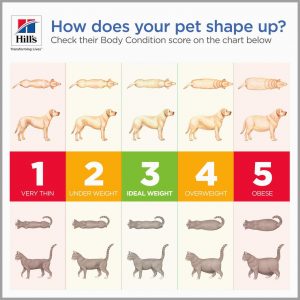Every time your dog or cat goes to the vet, their weight will be checked, and body condition score assessed. Why? Because your pet’s weight has a big impact on their health.
An overweight or obese pet is not only at a significantly increased risk of developing serious health complications but is also likely to have a lower life expectancy.
If your pet is a bit on the pudgy side, they’re not alone. A research study discovered that 41% of dogs and 32% of cats in Australia are either overweight or obese – a figure that is definitely on the rise.
How do I know if my pet is overweight?
Like us humans, weight can creep up on our pets, and we may not even realise that they are overweight until it’s pointed out by your vet. That’s another reason why annual health check-ups are so important.

At each health check, your vet will weigh your pet, and keep a track of their weight from each visit. They will also assess your pet’s body condition score, using a chart similar to the one shown below.
Pets are typically considered overweight if they weigh over 10% more than their ideal bodyweight, and obese if they are more than 20% over their ideal weight.
A few things that you can keep an eye on include:
- Is your pet’s stomach rounded or sagging with weight?
- Can you feel your pet’s ribs?
- Is their waist visible?
- Are they carrying extra weight at the base of their tail?
What are the consequences of an overweight pet?
An overweight cat or dog will typically have a lower life expectancy and a poorer quality of life. They are also much more likely to be diagnosed with serious health complications, including:
- Diabetes
- Osteoarthritis
- ACL tears (particularly in dogs)
- Respiratory conditions
- Kidney disease
- Cancer
While many of these conditions are treatable, they will have a considerable impact on your pet’s life and may well mean that they won’t live as long as they would have if they were a healthy weight. Your hip pocket will also be affected, as these conditions need extra visits to the vet, regular medication, and in some cases, surgical procedures.
What can I do to help my pet lose weight?
If your vet is concerned that your dog or cat is overweight or obese, they will provide you with detailed advice regarding diet and exercise to help your pet maintain a healthy weight. This is not a judgment of you as a pet owner or a person but is simply your vet wanting your dog or cat to live their healthiest – and longest – possible life.
While the key advice for weight loss is the same for pets as it is for people – eat less and move more – your vet will be able to provide you with individualised, specific advice based on your pet’s age, breed and lifestyle.
A few key things you can do to help your pet lose weight include:
- Regular daily exercise – a vigorous walk for dogs and some energetic indoor play for cats
- Eliminate any treats
- Carefully measure how much food you give your cat or dog – you may be surprised how much food you give them each day
- Don’t give in when your pet begs you to share food – distract them with play instead
- Make them work for their food by using toys that slowly dispense dry food
- Listen to your vet and follow their advice – they are your best guide to keeping your pet’s weight in check
Got more questions?
If you have any concerns about your pet’s weight, the vets at our Cameron Veterinary Services small animal clinic in East Gawler can help. To make an appointment, call 08 8318 1801 or book online.



